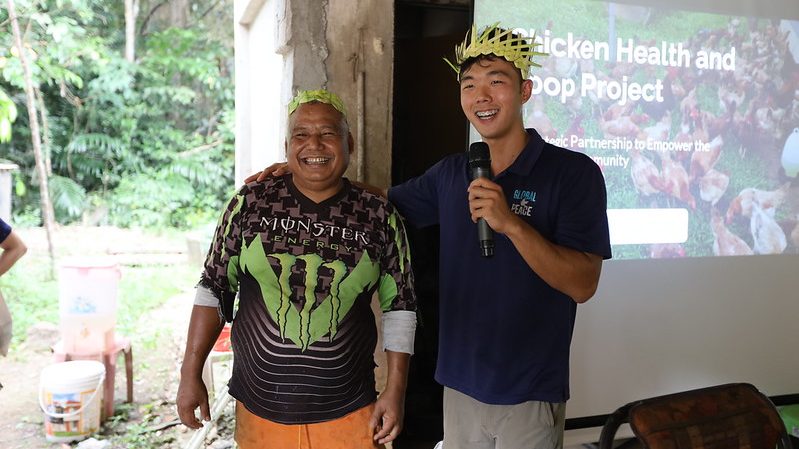
In the wake of 2022, as communities worldwide began to recover from the impacts of COVID-19, a pressing reality came to light for the Orang Asli families, the stark loss of income and dwindling food supply.
During the lockdown, most Orang Asli families lost their incomes and faced food shortages, relying on unsustainable food relief.
This period of uncertainty underscored a crucial question: how could we, as a society, offer enduring support to ensure such situation are mitigated in the future?
The Orang Asli children in Malaysia face alarming rates of malnutrition, with over 40% of children under two already underweight and malnutrition rates reaching 60-70% in late childhood. This severe malnutrition is closely linked to high poverty rates and external social factors, such as resettlement schemes and deforestation, which disrupt traditional food sources.
Dr. Amar-Singh HSS, Ho Khek Choong, Teh Su Thye, Jerald Joseph, & Vivien Yew Wong Chin. (2023). Health Provision for the Orang Asli: Uncharted Paradigms. Indigenous Communities in Malaysia: Reframing the National Sustainability Initiative. RYTHM Foundation & UKM Joint Convention, 21-22 June, 2023, UKM, Malaysia.
It was within this context that chicken farming emerged as a pivotal cornerstone. Far from being just an agricultural activity, it became a conduit for empowering the Orang Asli with invaluable skills and knowledge in sustainable farming. Establishing chicken farming will provide several benefits; it will help save money by reducing the need to buy food from the market, foster self-sufficiency, and improve nutrition through a diversified diet of poultry and eggs. Additionally, it will ensure food security during uncertain times and offer potential income generation in the long term.
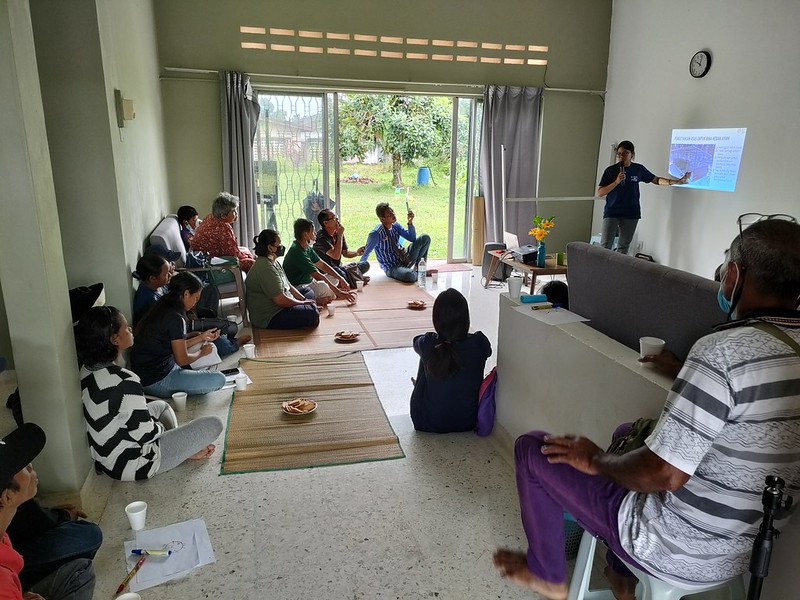
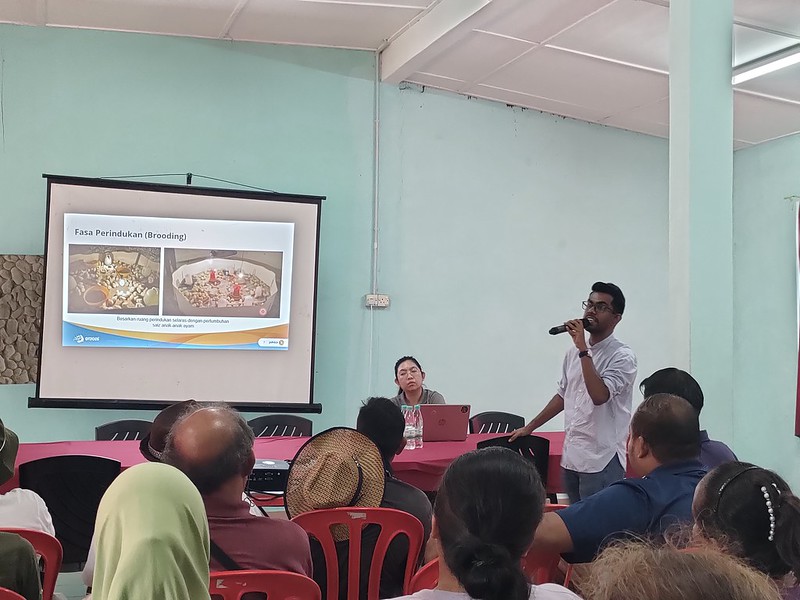
Some of our farmers had experience in chicken rearing, but they need more formal training and guidance. Recognizing this gap, our initiative not only provided them with resources but also offered comprehensive training sessions, empowering them with the knowledge and skills needed to enhance their traditional practices into sustainable and thriving chicken farming method.
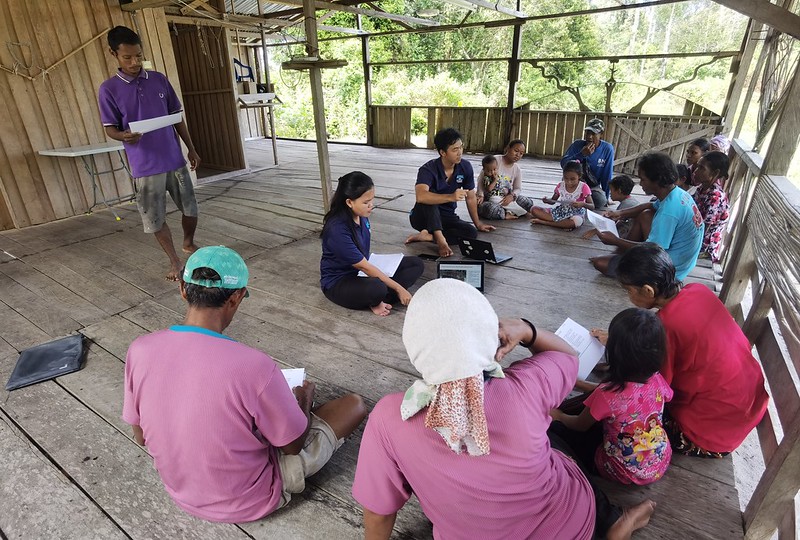
Central to our mission is the concept of capacity building in equipping the Orang Asli community with the necessary expertise to succeed in chicken farming, thereby ensuring their livelihoods, nutrition, and food security are fortified against future uncertainties.
Our observation indicates that most Orang Asli families lack protein in their daily diet, as they cannot afford to buy meat and their traditional protein sources, such as fish, are harder to obtain due to river pollution from logging and plantation activities.
Our commitment to this cause is deeply rooted in our core values and objectives, aiming not only to support but to elevate the Orang Asli community towards sustainable self-reliance.
Our team stories
Our team has always been the heart and soul of this journey, led by Ah Siu and Eliena, they embodies the passion and drive that fuel our journey. Their commitment shines brightest when they witness the spark of excitement in our chicken farmers’ eyes, a passion that mirrors their own.
Our team also managed five training sessions encompassing modules on free-range chicken care, disease prevention, coop maintenance, supplementary feeds planting, and marketing strategies.


Venturing all the way to Melaka, our team embarks on nocturnal journeys to collect chicks, ensuring their safe delivery to the villages, often working tirelessly until the early hours past midnight. This relentless dedication is evident to our overarching goal which is to empower and stand alongside our farmers, providing guidance and support every step of the way.
Eliena, our field officer who is a Jakun Orang Asli member herself finds deep fulfillment in the visible joy and satisfaction of the farmers.
“The happiness I see on their faces makes this initiative profoundly rewarding.”
Eliena (Field Officer)
However, our team’s efforts extend far beyond this. They engage in comprehensive training sessions with the farmers, equipping them with essential skills and knowledge. From teaching them how to produce fish fertilizers – use for for the plantation of alternative food sources and creating Effective Microorganisms (EM) to guiding them through the step by step of chicken processing, our team ensures that the farmers are well-prepared. This includes emphasizing the importance of hygiene, and the techniques for packing and weighing chickens, ensuring that our community is adept and are familiar with the whole process.
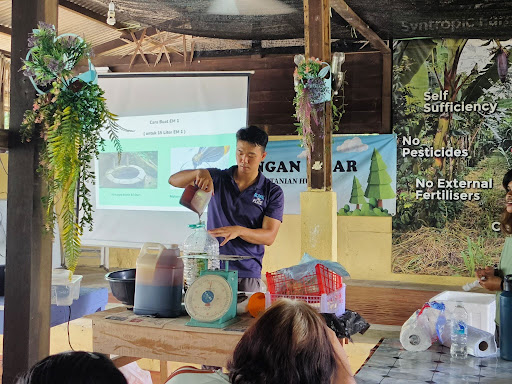
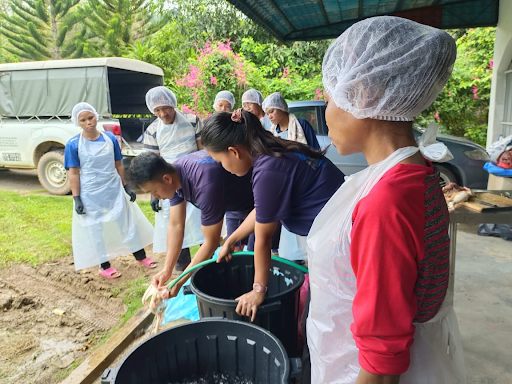
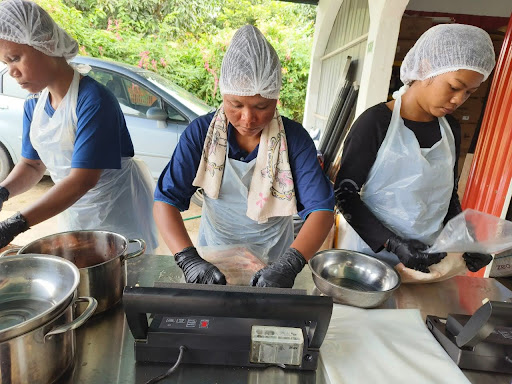
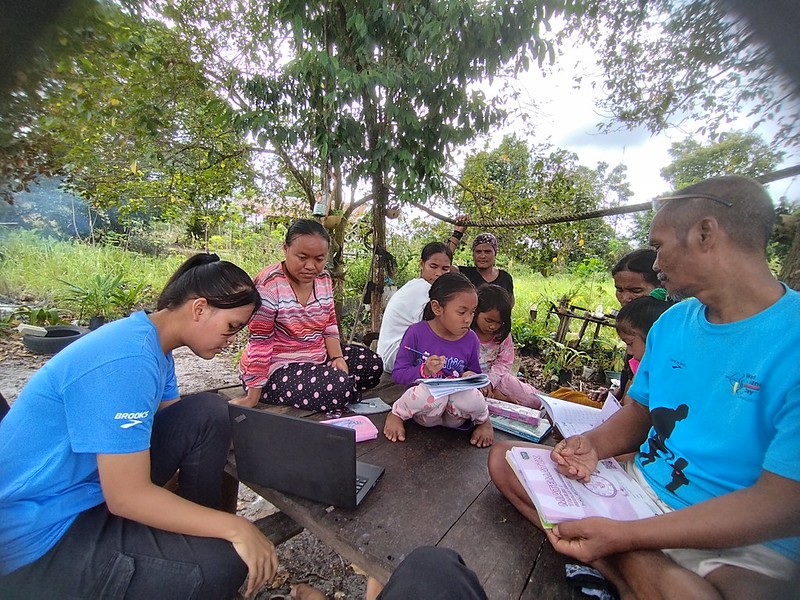
“Our main objective is to support them, assuring them of our constant presence and guidance.”
Chungsiu (Field Officer)
Our farmer stories
This time around, let’s take a glimpse into the daily lives of our farmers, who bring heart and soul to caring for their chickens.
Nasimah starts her day with a simple yet crucial task. She hangs greens around the coops, a practice that’s about more than just feeding. It’s her way of giving the chicks a boost of natural nutrients, ensuring they grow up healthy and strong.
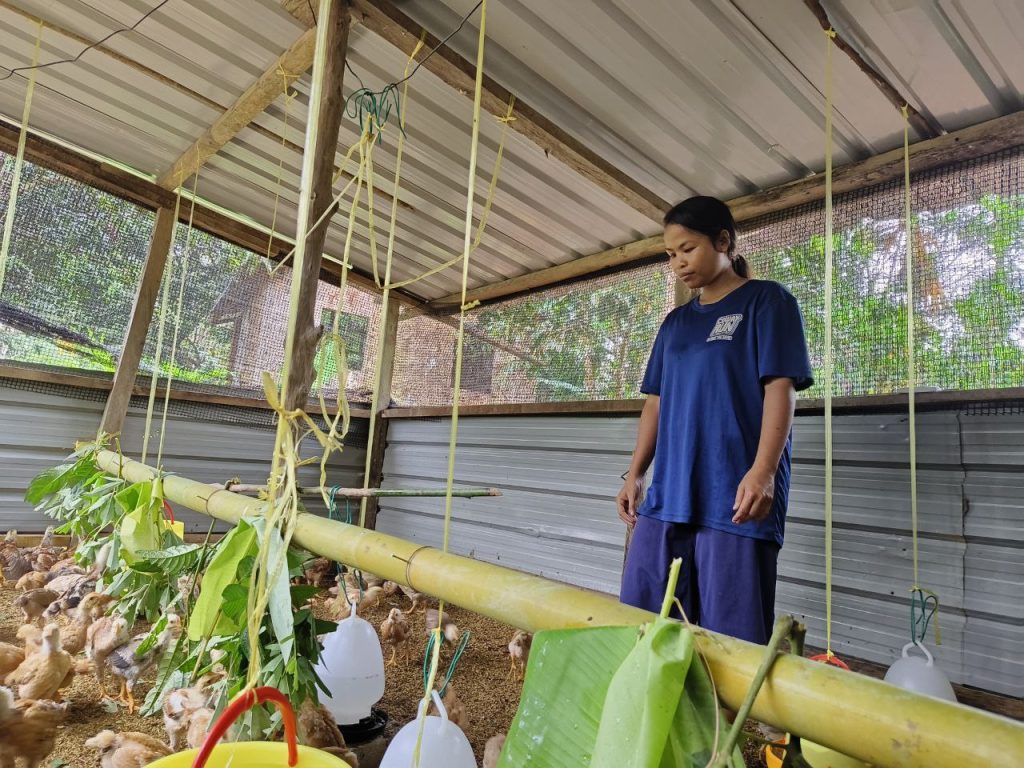
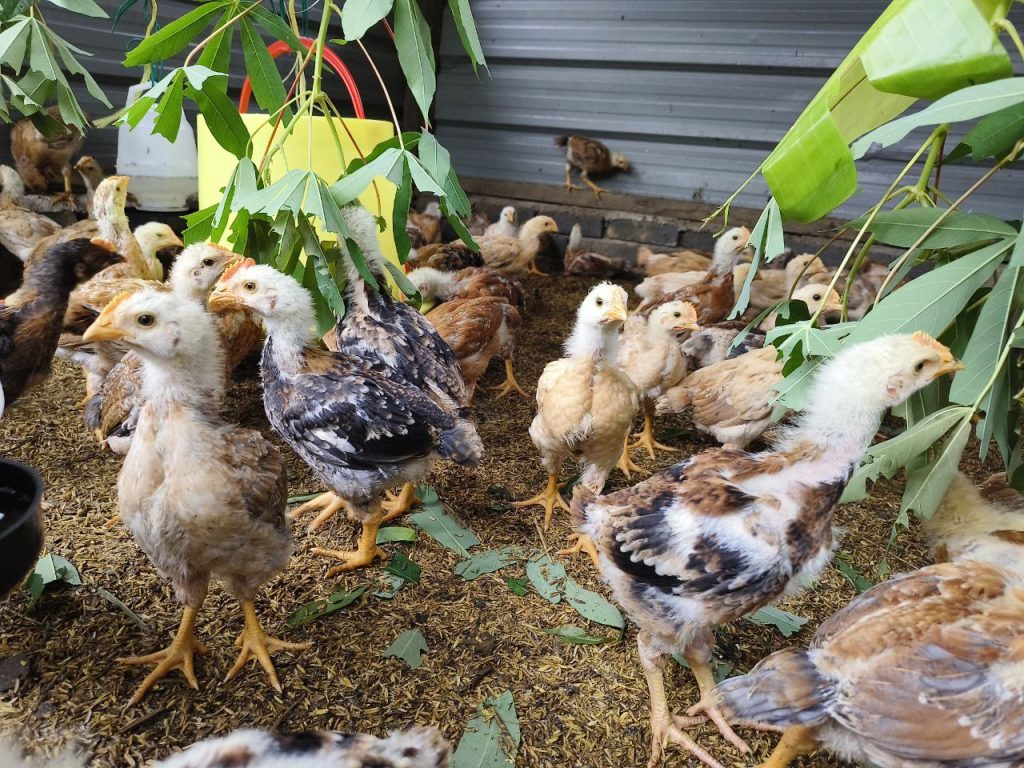
Their alternative food sources include greens such as banana leaves, cassava leaves, and ketum ayam leaves.
Nasimah
Over in another part of the farm, you’ll find Mamak Ali, busy with his daily routine. He’s got a green thumb and a plot full of fresh greens, which he gathers every day for the chicks.
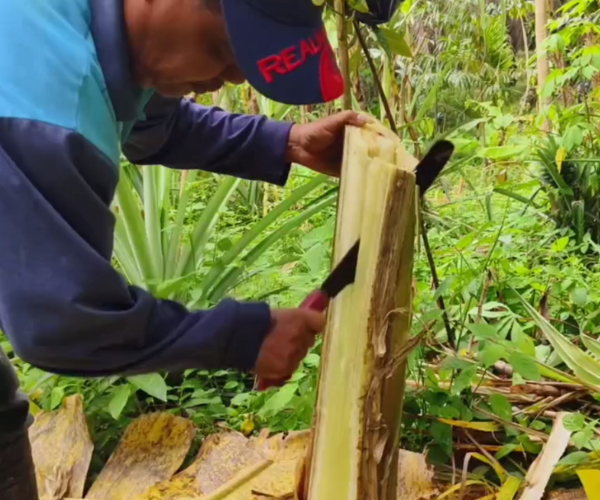
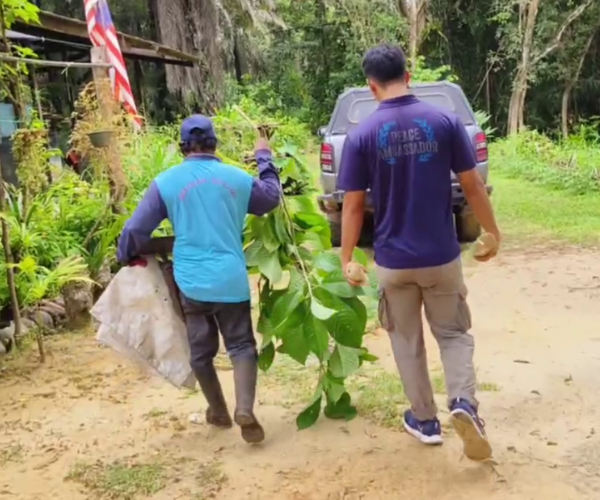
This isn’t just feed – it’s a fresh, natural diet straight from his garden, giving the chicks the best of what nature offers.
I’ll split the banana trunk in half and use the fresh inner part. I’ll chop it into smaller pieces and mix it into their feed pellets.
Mamak Ali
Then there’s Mamak Lipak, for whom a clean home for the chicks is the top priority. He regularly changes the wood remnants in the coops, keeping the space dry and comfortable. With the help of his family – they meticulously cleans the food and water pellets every day. It’s all about creating a clean, healthy environment for the chicks to thrive.



I feed them twice a day, at about 7 AM and 4 PM. I also regularly replace the wood remnants in their coop whenever I notice they are getting wet
Mamak Lipak
As evening approaches, Mamak Amran steps in with his own unique practice. He lights mosquito coils around the coops. It’s his way of keeping the chicks safe from mosquito bites, a small but significant act that shows his deep care and concern for their well-being.



This is my first time raising chickens, and I’ve thoroughly enjoyed it—seeing them run around brings me joy. Just like humans, they need plenty of food and water to thrive.
Mamak Amran
These aren’t just tasks – they’re acts of love and dedication from our farmers!
The impact of this project has been profound. The income levels of participating families have seen a positive shift as they can now sell surplus chickens, creating a sustainable source of revenue. The skills and knowledge gained through this initiative have not only fostered self-sufficiency but have also instilled a sense of pride and accomplishment among the farmers. With the added support of our marketing efforts, the farmers are now well-equipped to continue thriving in their chicken farming endeavors, ensuring long-term success and resilience.
Watch our marketing videos below. Available in English and Chinese languages
Since 2022, more than 65 farmers have constructed chicken coops and started on the chicken farming journey. To date, we have collaborated in marketing our chickens, receiving encouraging support from the community. Moving forward, our goal is to further strengthen our farmers’ expertise in both chicken rearing and marketing, ensuring they are well-equipped for sustained success. From the ground up, one coop at a time!
We extend our heartfelt thanks to our sponsor, Gold Coin, whose generous support has been instrumental in making this initiative a reality. Their invaluable contributions, including the provision of veterinarians for training and essential resources, have played a crucial role in empowering the Orang Asli community.
Building resilient communities, one village at a time
Written by:
Sofia Aminudin

1 Comment